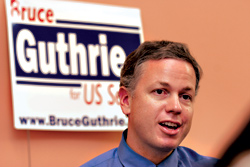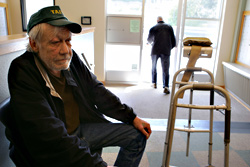Three weeks ago, it looked as though the hopes of medical marijuana users around the country would go up in smoke. On Monday, June 6, the U.S. Supreme Court ruled that medical marijuana laws passed by 10 states, including Washington, didn’t matter and that the federal government and federal law enforcement agencies could proceed with using federal drug laws to bust medical marijuana users. Now, it appears that medical marijuana users will receive different treatment depending on where they live—things have quickly gotten worse in California, but Washington is experiencing no change as yet.
So far, the feds have made a great show of going after so-called clubs selling pot to patients in California. On Wednesday, June 22, the feds busted 13 people in raids of three clubs in Northern California.
But in Washington there are no clubs and there is no official distribution network for getting pot to medical marijuana patients. Neither is there a state-operated medical marijuana registry as in Oregon. Oddly, because Washington’s system is underground, that may work to medical marijuana patients’ advantage, even though it clouds the issue in other respects.
Both U.S. Attorney for Western Washington John McKay and the local outpost of the federal Drug Enforcement Agency (DEA) would have to get very interested in busting small-time users, who also happen to be people enduring cancer or AIDS or chronic pain, in order to get at medical marijuana.
For now, it looks as though that won’t happen.
“Our view is that this [court ruling] does not change the way we do our job,” says Emily Langlie, a spokesperson for McKay. “The emphasis of this office is on complex drug organizations and organized crime dealing in drugs.”
In the past, local attorneys say that, in the Seattle area at least, the feds have not messed with medical marijuana users very much, if at all.
The local DEA office did not return a request for comment.
Nationwide, part of the response to the ruling has come from states’ rights advocates, who see the Supreme Court justices operating like Big Brother and Big Sister. In Oregon, state Attorney General Hardy Myers issued an opinion that the state could continue to issue medical marijuana cards on the grounds that principles of states’ rights weren’t stripped from the U.S. Constitution by one court ruling.
Rob McKenna, Washington state attorney general, has largely remained mute on the tension between Washington state statute and federal law. “The decision has no bearing on the operation of our statute,” says Janelle Guthrie, his spokesperson.
All of that sounds like reassurance that the winking and nodding given to medical marijuana in this state since the passage of Initiative 692 in 1998 will continue.
Not everyone trusts leaving it to benign neglect, however, because there’s nowhere to turn for aid and comfort now that the feds have been given full permission to go after medical marijuana users.
“For the court to say to us, ‘Go to Congress,’ is about like telling me to go to my closet and talk to my sports coats,” says Jeffrey Steinborn, a local attorney who defends pot patients.
“What I’d like to see is a strong statement in support of the statute” from McKenna, says Andy Ko with the Washington chapter of the American Civil Liberties Union. “There are a lot of prosecutors’ offices that could use some guidance.”
McKenna’s office says there are no plans for McKenna to issue any opinion.
Ko says the real worry isn’t with the feds right now but with prosecuting attorneys in Thurston, Stevens, and other more rural counties where they’ve prosecuted medical marijuana users in disregard of the state’s medical marijuana law.







